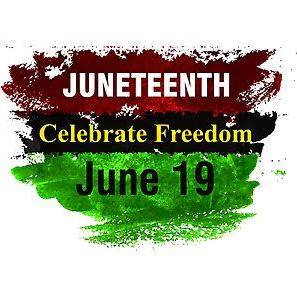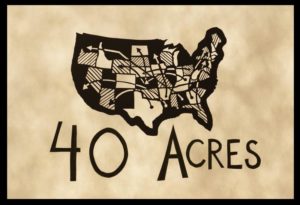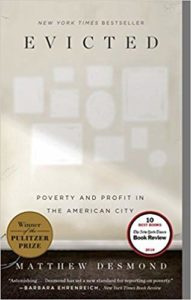Evictions
Juneteenth/40 Acres
June 17, 2019“Juneteenth is the oldest nationally celebrated commemoration of the ending of slavery in the United States.
From its Galveston, Texas origin in 1865, the observance of June 19th as the African American Emancipation Day has spread across the United States and beyond.
Today Juneteenth commemorates African American freedom and emphasizes education and achievement. It is a day, a week, and in some areas a month marked with celebrations, guest speakers, picnics and family gatherings. It is a time for reflection and rejoicing. It is a time for assessment, self-improvement and for planning the future. Its growing popularity signifies a level of maturity and dignity in America long over due. In cities across the country, people of all races, nationalities and religions are joining hands to truthfully acknowledge a period in our history that shaped and continues to influence our society today. Sensitized to the conditions and experiences of others, only then can we make significant and lasting improvements in our society.” [juneteenth.com]
~
Eviction isn’t without its own historical context. In vulnerable communities of people of color, in particular, displacement and denial of housing are phenomena centuries in the making. This episode maps the persistent line between racist housing policies, localized profiteering, and the devastating plunder of generations of wealth.
On the Media
From June 14th:
‘We continue our four-part series on eviction by charting the persistent line between racist housing policies, localized profiteering and the devastating plunder of generations of wealth. Guests include Matt Desmond [@just_shelter], founder of the Eviction Lab; Natalie Moore, reporter for WBEZ; and Marty Wegbreit, director of litigation for the Central Virginia Legal Aid Society.’
https://www.wnycstudios.org/story/on-the-media-40-acres
From June 7th:
‘Millions of rent-burdened Americans face eviction filings and proceedings every year. On this week’s On the Media, what we think we know, and what we definitely don’t know, about America’s eviction crisis.
We hear the story of Jeffrey, a security guard in Richmond, Virginia whose severe rent burden caused his family to be evicted.
Matthew Desmond, founder of the Eviction Lab, explains what he and his fellow researchers have learned from their massive collection of eviction data.’
https://www.wnycstudios.org/story/introducing-the-scarlet-e-the-media
To discover eviction rates in your area visit:
https://www.wnycstudios.org/shows/otm/scarlet-e-unmasking-americas-eviction-crisis
Evictions are filed over 3.7 million times a year in America — or at a rate of one every seven seconds. The eviction epidemic has bedeviled more lives than the opioid crisis and still its causes — and consequences — remain largely ignored or misunderstood.
With the help of Matt Desmond and the Eviction Lab, which has compiled the largest-ever database of eviction records, our series charts a course through a thicket of contradictions and assumptions to reveal the heart of the crisis.
You can take your own first step on this course by witnessing the data from your own state, in comparison with two states that we visited in our reporting.
“Evicted stands among the very best of the social justice books.” —Ann Patchett, author of Bel Canto and Commonwealth
‘In Evicted, Princeton sociologist and MacArthur “Genius” Matthew Desmond follows eight families in Milwaukee as they each struggle to keep a roof over their heads. Hailed as “wrenching and revelatory” (The Nation), “vivid and unsettling” (New York Review of Books), Evicted transforms our understanding of poverty and economic exploitation while providing fresh ideas for solving one of twenty-first-century America’s most devastating problems. Its unforgettable scenes of hope and loss remind us of the centrality of home, without which nothing else is possible.’ [Amazon]
For expanded investigative reporting on redlining, visit:
https://www.revealnews.org/tag/redlining/
‘We engage and empower the public through investigative journalism and groundbreaking storytelling that sparks action, improves lives and protects our democracy.
Founded in 1977 as the nation’s first nonprofit investigative journalism organization, The Center for Investigative Reporting has developed a reputation for being among the most innovative, credible and relevant media organizations in the country.
Reveal – our website, public radio program, podcast and social media platform – is where we publish our multiplatform work.’
The New Yorker
June 2019
Ta-Nehisi Coates Revisits the Case for Reparations
It’s not often that an article comes along that changes the world, but that’s exactly what happened with Ta-Nehisi Coates, five years ago, when he wrote “The Case for Reparations,” in The Atlantic. Reparations have been discussed since the end of the Civil War—in fact, there is a bill about reparations that’s been sitting in Congress for thirty years—but now reparations for slavery and legalized discrimination are a subject of major discussion among the Democratic Presidential candidates. In a conversation recorded for The New Yorker Radio Hour, David Remnick spoke with Coates, who this month published “Conduction,” a story in The New Yorker’s Fiction Issue. Subjects of the conversation included what forms reparations might take, which Democratic candidates seem most serious about the topic, and how the issue looks in 2019, a political moment very different from when “The Case for Reparations” was written.





